
COVID-19 Alert Band
COVID-19 Alert band, to help reduce the spread of the virus as people become accustomed to level three of lockdown within the UK
COVID-19 Alert Band
Since COVID-19 has spread across the globe, each country has approached the issue in its way. This project focused on the UK approach to the COVID-19 crisis.
By the end of 2019, a coronavirus was identified in Wuhan, China. With the virus having a potential R nought of 5.7, this virus could become a global pandemic, on the 23rd of March 2020 the UK was put on a full nationwide lockdown to reduce the spread of the newly named COVID-19 With limited reasons to leave the house, a set of new social distancing measures were required to be put into place to avoid what limited contact the normal individual would have with other people while shopping for essentials.
On the 13th of May new measures were brought in to begin to reduce lockdown measures. However, stringent social distancing measures were in place; this reduces in lockdown measures would still increase the interaction rate and potential risk of a second surge of COVID-19 diagnosis rate.
The Pandemic
As COVID-19 spread across the globe, each country dealt with it in their way. Each counties aim was to flatten the curve of infection rate; results varied with the US being one of the worse affected, with the UK not far behind with infection per populous. The NHS was not overrun and was able to cope with demand. Once the dust had settled, the next question was, how were we to resume life before COVID?
The COVID-19 Geiger
The COVID-19 Geiger is designed to be produced as a government initiative to keep the general public aware of other people's health around them and stem the potential risk of a second COVID-19 outbreak. The device is to be worn by a high percentage of the UK public, as a way to detect potential COVID-19 symptoms of people around them. The device measures the users own temperature for a week to gain a median temperature of the user. If the users' temperature is raised, the band will turn on and begin to send out a signal to surrounding bands that the person has a raised temperate and to stay way. The band is to force people to be aware that COVID-19 has not gone away and cannot become complacent.
5 Stages of COVID-19
As the cases and deaths began to reduce the government released a five step to phase the country out of lock down, Each step had its own set of criteria that must be met to be able to go into the next phase, to eventually go to stage one. The country back to normality, however, if infection returns individual counties can go back into further restrictions.
Social Distancing
Social distancing has been a critical factor to allowing the population to get essentials from the food shops in the peak and imperative to reducing the chances of a second wave of infections as we go lower in the stages of outbreak measures.
The COVID-19 Geiger
The COVID-19 Geiger is designed to be produced as a government initiative to keep the general public aware of other people’s health around them and stem the potential risk of a second COVID-19 outbreak.
The device is to be worn by a high percentage of the UK public, as a way to detect potential COVID-19 symptoms of people around them. The device measures the users own temperature for a week to gain a median temperature of the user. If the users’ temperature is raised, the band will turn on and begin to send out a signal to surrounding bands that the person has a raised temperate and to stay way.
The band is to force people to be aware that COVID-19 has not gone away and cannot become complacent.
Depending on the R=0 of COVID-19. Which eventually confirmed by the WHO between 1.4-2.4.
At the time of this designs creation and concept development it was publicised that the infection rate could quickly changed within phases TWO and THREE.
And that within the space of two weeks, it would be possible for the virus to return quicker than can be controlled; this is where the COVID Gieger is to be used. During these two phases where the general population begin to break the rules set by the health minister, the band is designed to ensure that even during these lower levels people are still aware that the virus is still in a global pandemic and is still in circulation.

Sketch process
To reduce the size of this portfolio I have included an abridged version of the sketch package
Covid-19 band concept selections
Above are a variety of sketch concepts of the COVID-19 Geiger. As this was a more aesthetic project, I selected a more extensive range of concepts to take forward.
Each watch will hold the same technology within the band.
Large Watch Face
I do like the large watch face element of this design as I decided to take this design forward but it would need further development.
Duel Push button
— I do like this design as a self contained two push button monitor, however I feel to reduce costing it would be best have a single button
Concept 1
To speed up the project, I ran with two designs. The majority of the design decisions were finalised during the rapid prototyping using Flexi-filament and PLA. Though by that point in the design process, the main bones of the design have been confirmed.
Concept 2
This was the second option that I decided to take forward. Though similar in design, this strap was to be more form fitting and being less evasive on the user’s arm.
Rapid Prototyping
If you would like to see more on Rapid Prototyping please press the button below, there is more development below
Component Spacing
As part of my rapid prototyping process, I like to create a scaled-up version of the internal components, this way, I can ensure that the design fits together well and highlight critical areas that need altering.
Ergonomic Refinement
As I created variations of the design, I realised that the small clasp on the back of the watch would have to be removed for a more straightforward mechanism using an embedded metal strip that would grip the wrist without the use of a clasp.
Quick Design Alterations
As I printed the bands, I realised that some aspects of the watch would have to change. They were ranging from how the strap held the watch body in place or how it fits around the user's wrist. All these alterations would always need refinement in a studio and with rapid prototyping in Flexi-filament speeds up this process and allow for quick, cheap adjustments.
Story Board
The Covid-19 Geiger in use
Story Boards an integral part of the design process, putting yourself in your users' shoes and understanding how they will interact with your product. Without this process, you run the risk of spotting key issues with your product.

Progressing Forward
Rapid prototyping
I ran this project to be able to rapid prototype the band and quickly analyse alterations needed as well as identify which straps would work and what would not. This helped keep the project moving and allow the group to be refined to give the user a pleasant wearing experience.
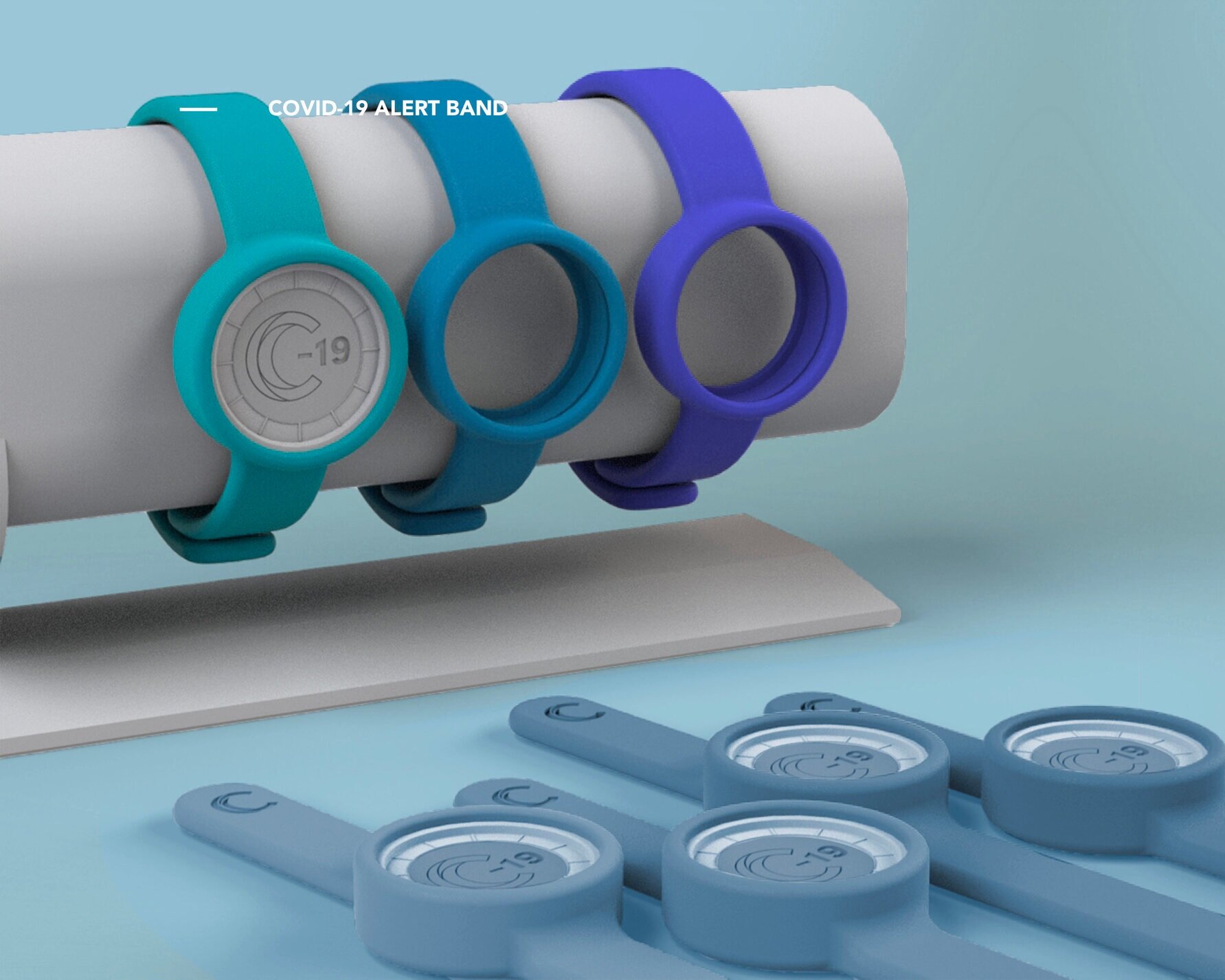
Finalised Concept
Below is the finalised concept package
Make it stand out.
Covid-19 Geiger
To the left is the final design of the Covid-19 Geiger. However, if you continue reading the design can be altered by the user before purchasing. The band is designed to be minimalist and less evasive on the user's wrist, this has been a vital element of the design process, especially if the band has to be worn for over a year.
As the design progressed, it was essential to understanding the spacing of the main body of the band. Resulting in the need for me to create all the PCB’s, battery, battery housing, rechargeable coil and elements within the watch to be placed, setting the height the main body.
Internal Components

Subconcious Social Distance
COVID-19 Geiger
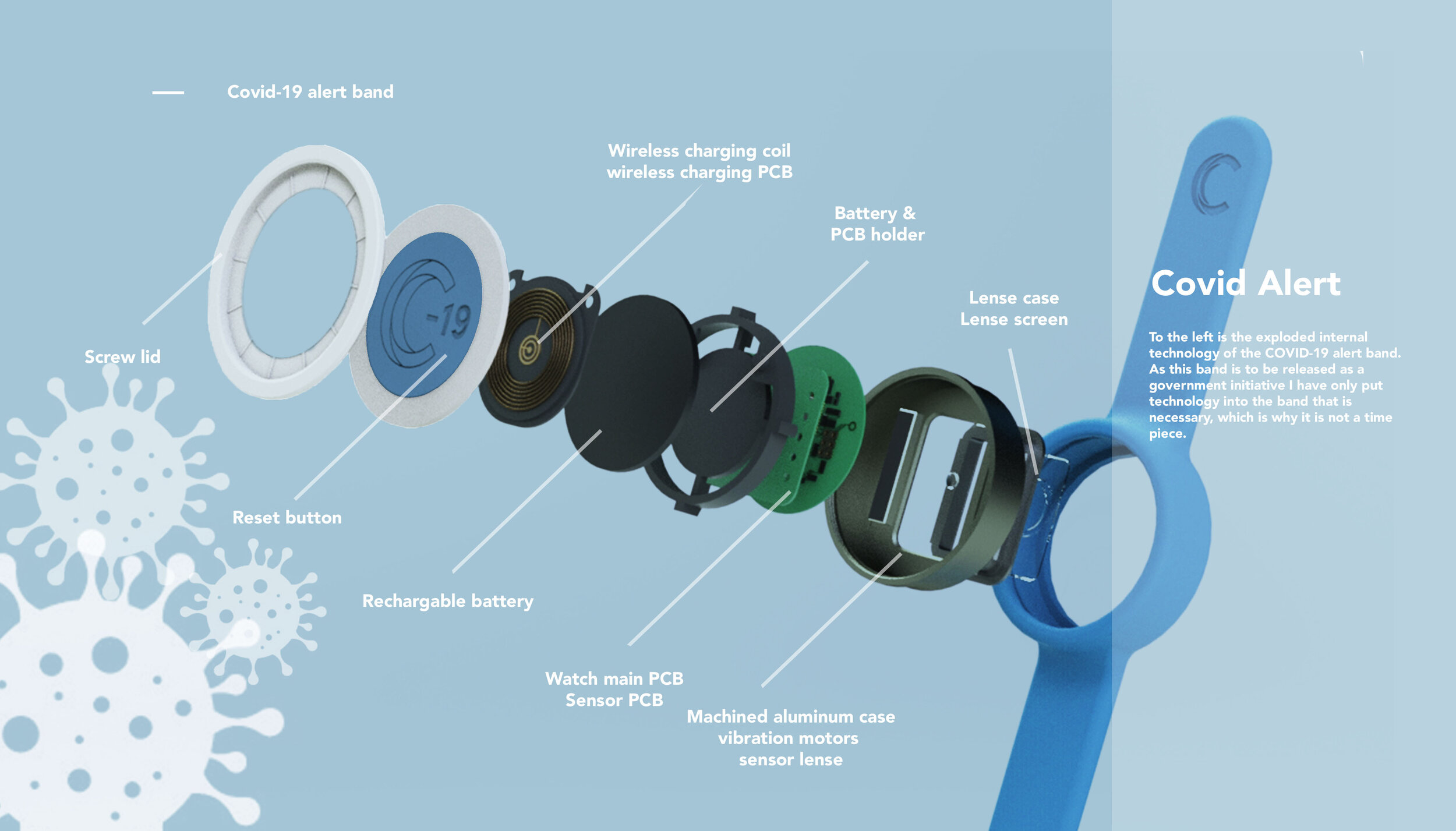
How Much will it cost the user?
The Covid-19 Geiger, will not cost the user for the unit, only for postage. The band itself will be released as a government initiative to try and avoid the second wave of infection. Avoiding a further lockdown will allow the economy to grow as people go to work and socialise safely.
The manufacturing cost will be covered by the COVID emergency fund, which at the creation of this work was at 1.5 billion. Each unit would cost under £5.00 to manufacture due to the high quantity of orders and minimum technology within the band.
However, as outlined lower in this portfolio, there are additional extras that the user could by through customisation and eventually later versions of the Covid-19 Geiger.
Components






Advertisements
To spark interest in the Covid-19 Geiger Advertisements would have to be placed in areas that are frequently used by members of the public, The aim of these posters would be to spark the viewers interest enough to investigate further.
Eye Catching
I like the design of these posters as it gives enough information to begin to get the viewer to become intrigued by what the product is. I did choose to use this version of the poster, though I thought it would be essential to show the other variations of the design.
Simplistic
This is a more simplistic design of the advertisement. Though I like the design, I feel that the line drawing doesn’t show enough detail of the band.
Silhouette
The silhouette could work. However, I feel that for the advertisement placement, it doesn’t show enough detail as the design above.
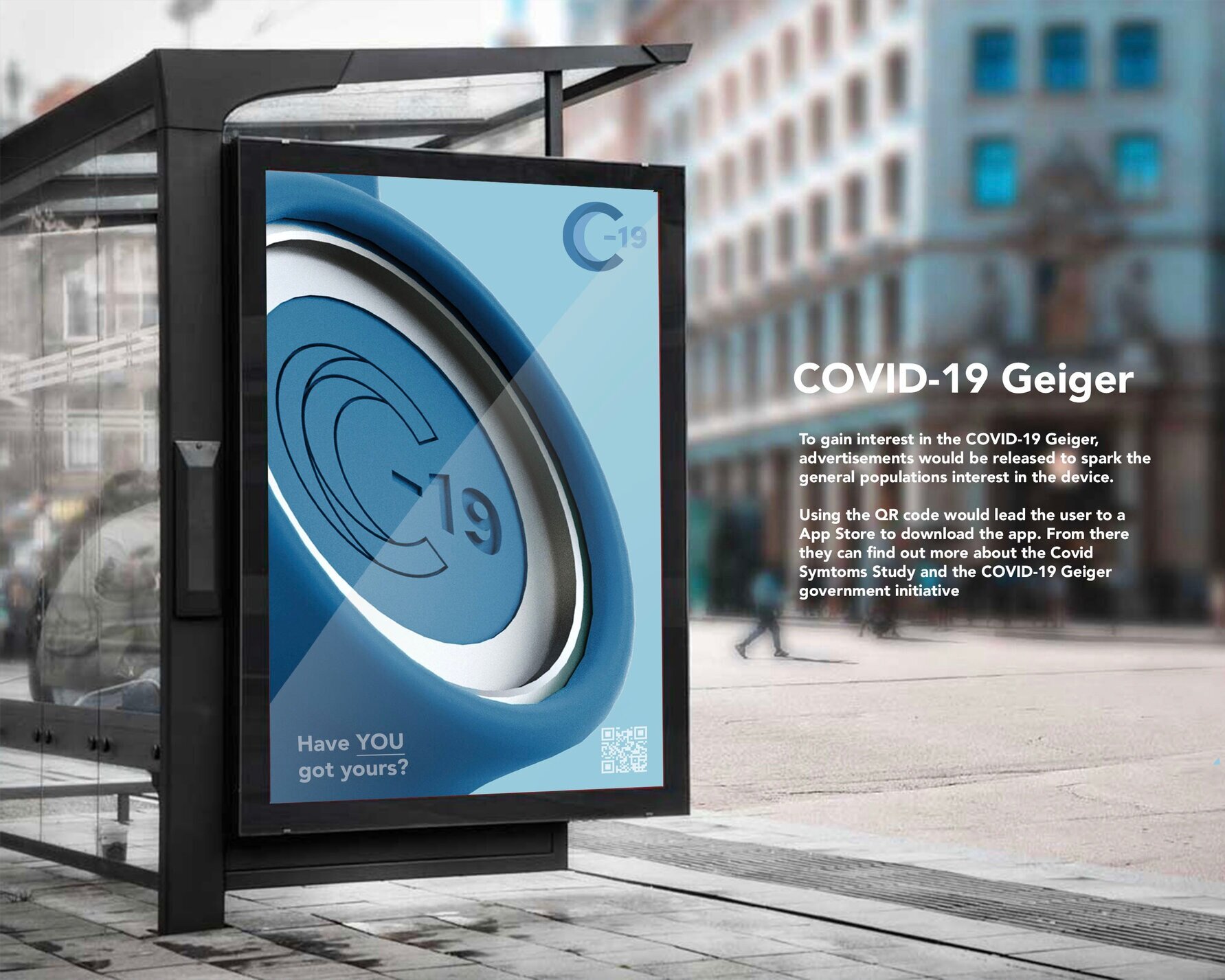
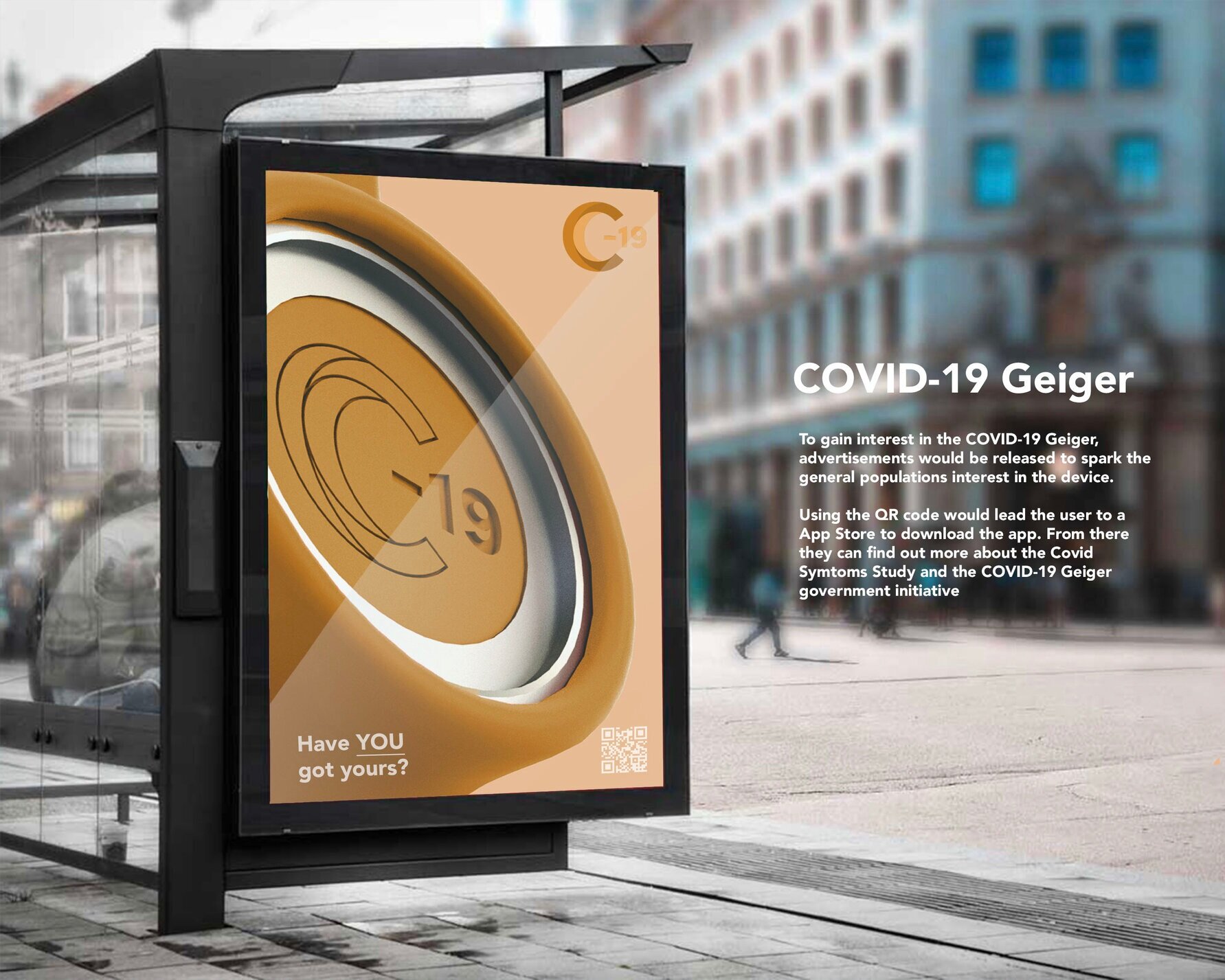

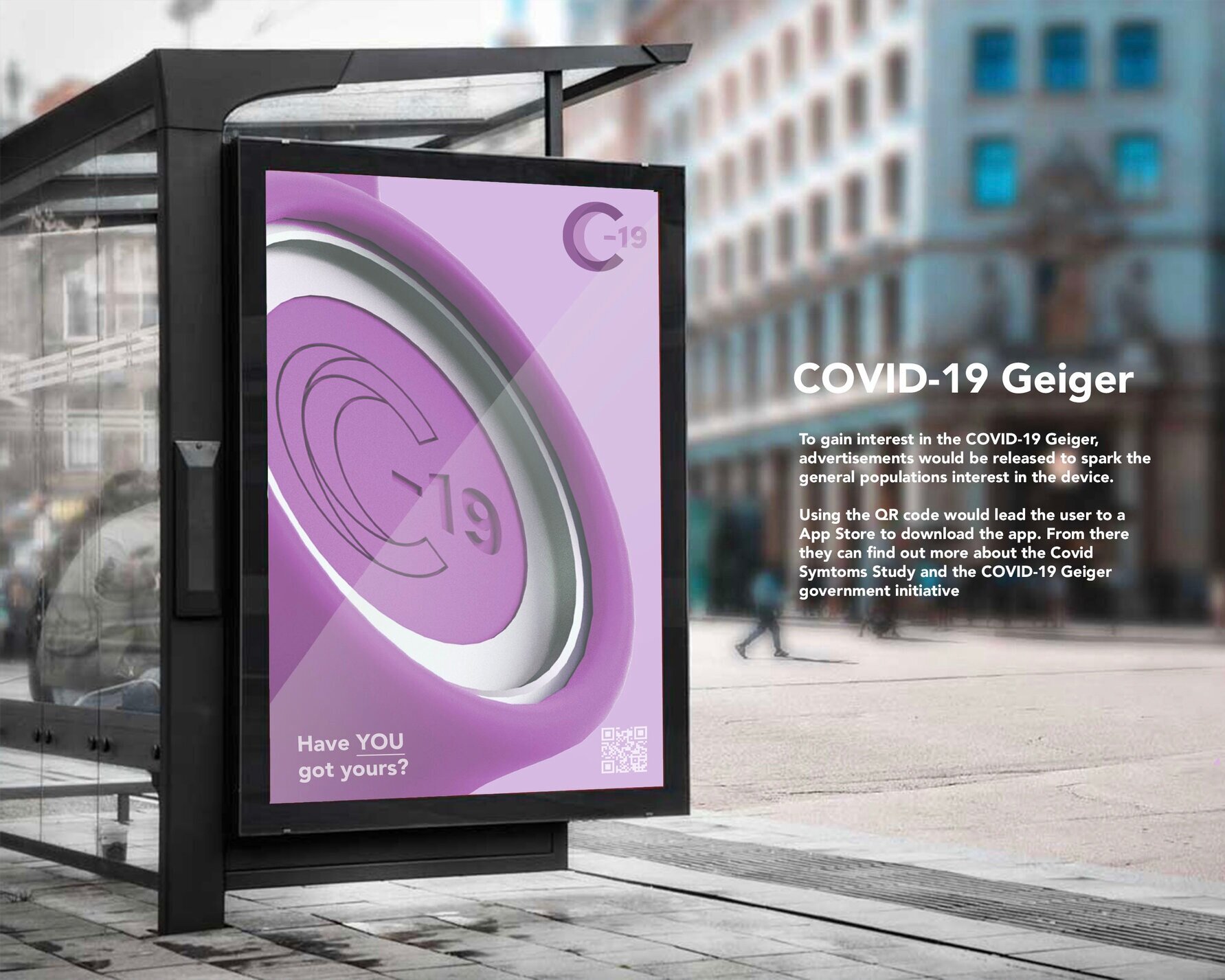
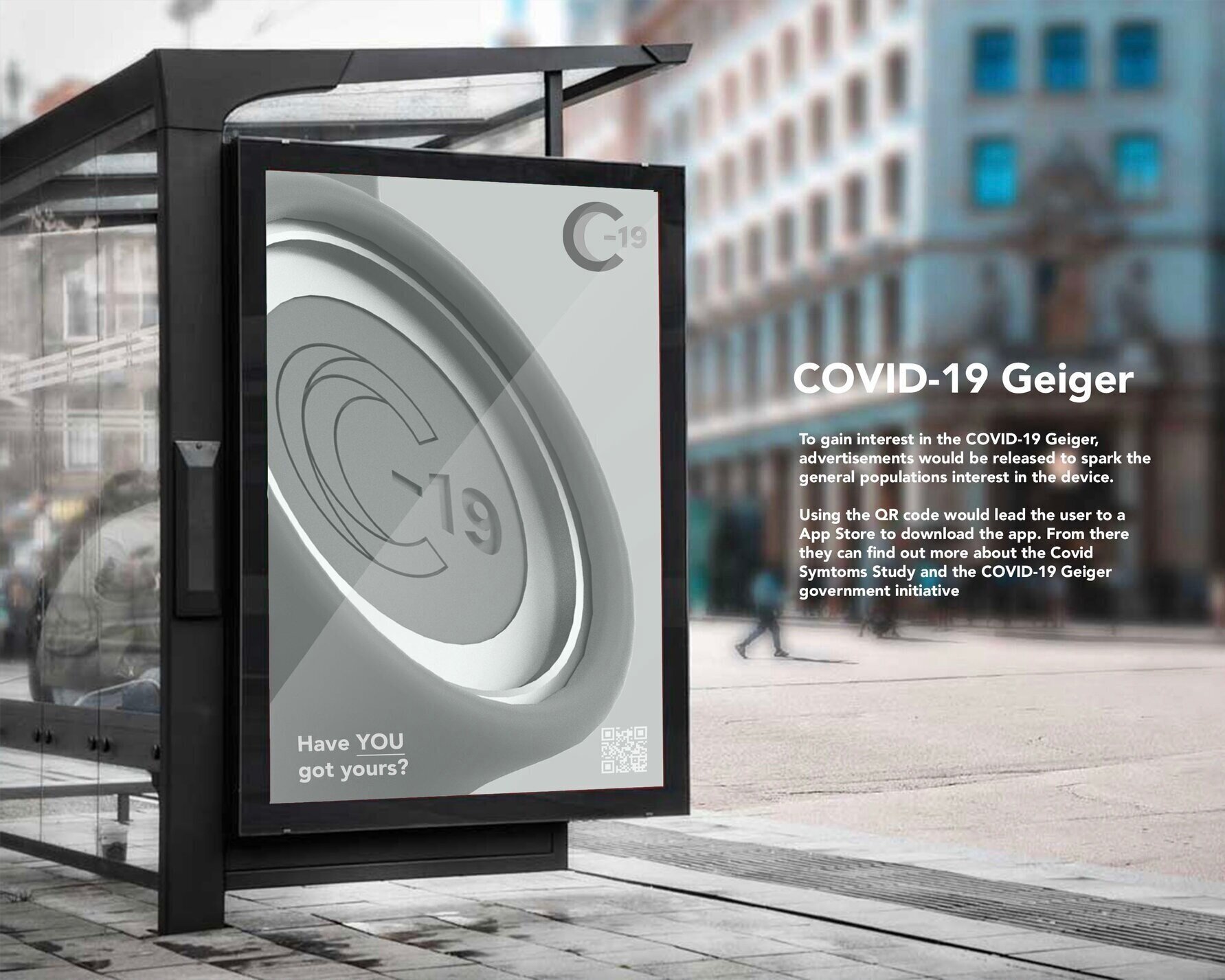

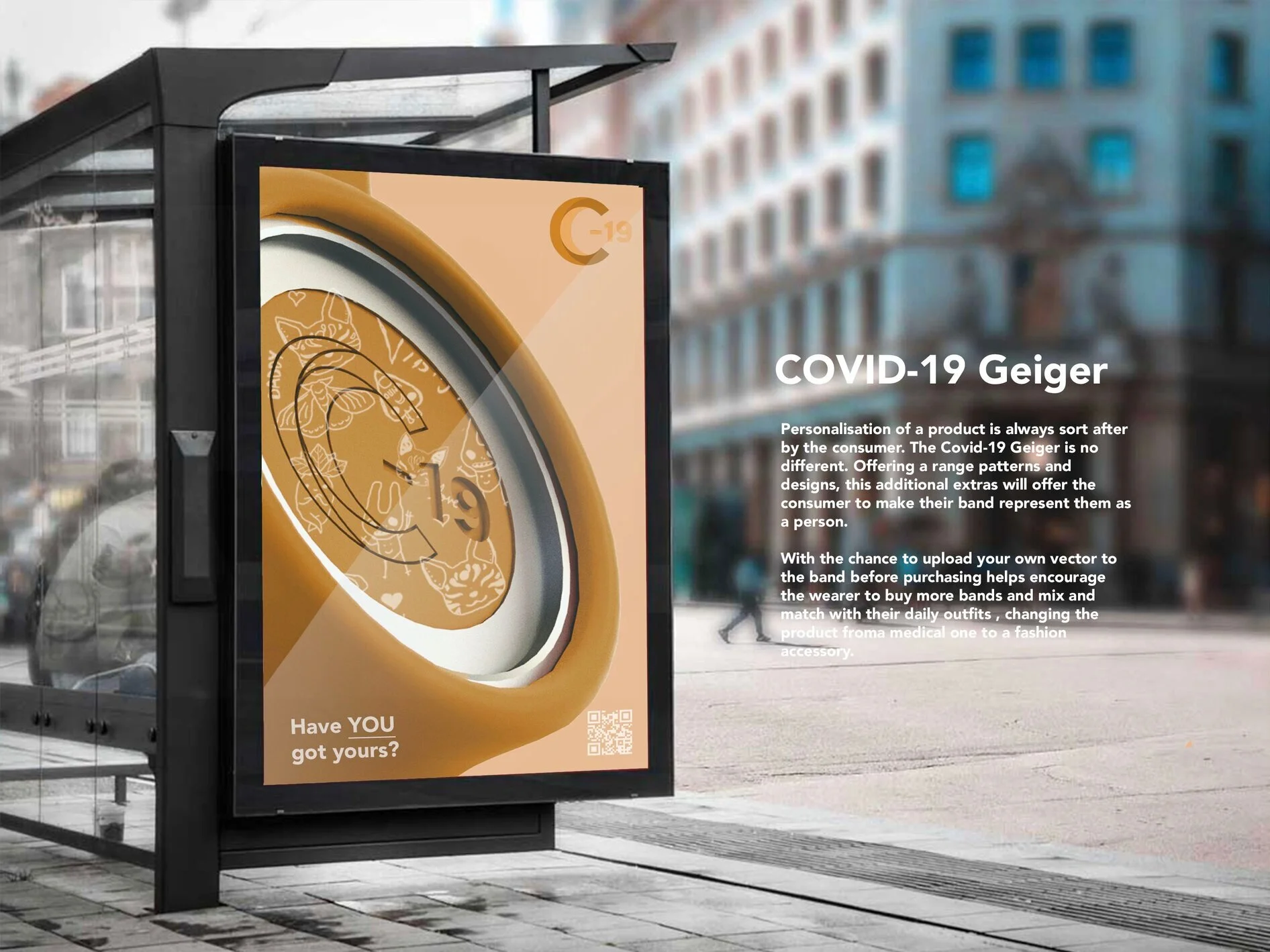
Personalisation sells a product
Personalisation of a product is always sort after by the consumer. The Covid-19 Geiger is no different. Offering a range of patterns and designs, these additional extras will provide the consumer with a chance to make their band represent them as a person.
With the chance to upload your design or vector. This encourages the consumer to buy a variety of brands and design to match with their daily outfits, changing the product from a medical one to fashion accessory.
Creating a brand identity that has room for expansion into a multitude of designs and styles, below is the process of gaining access to your band using the COVID symptoms study app extension.

COVID19 Geiger
UX DESIGN
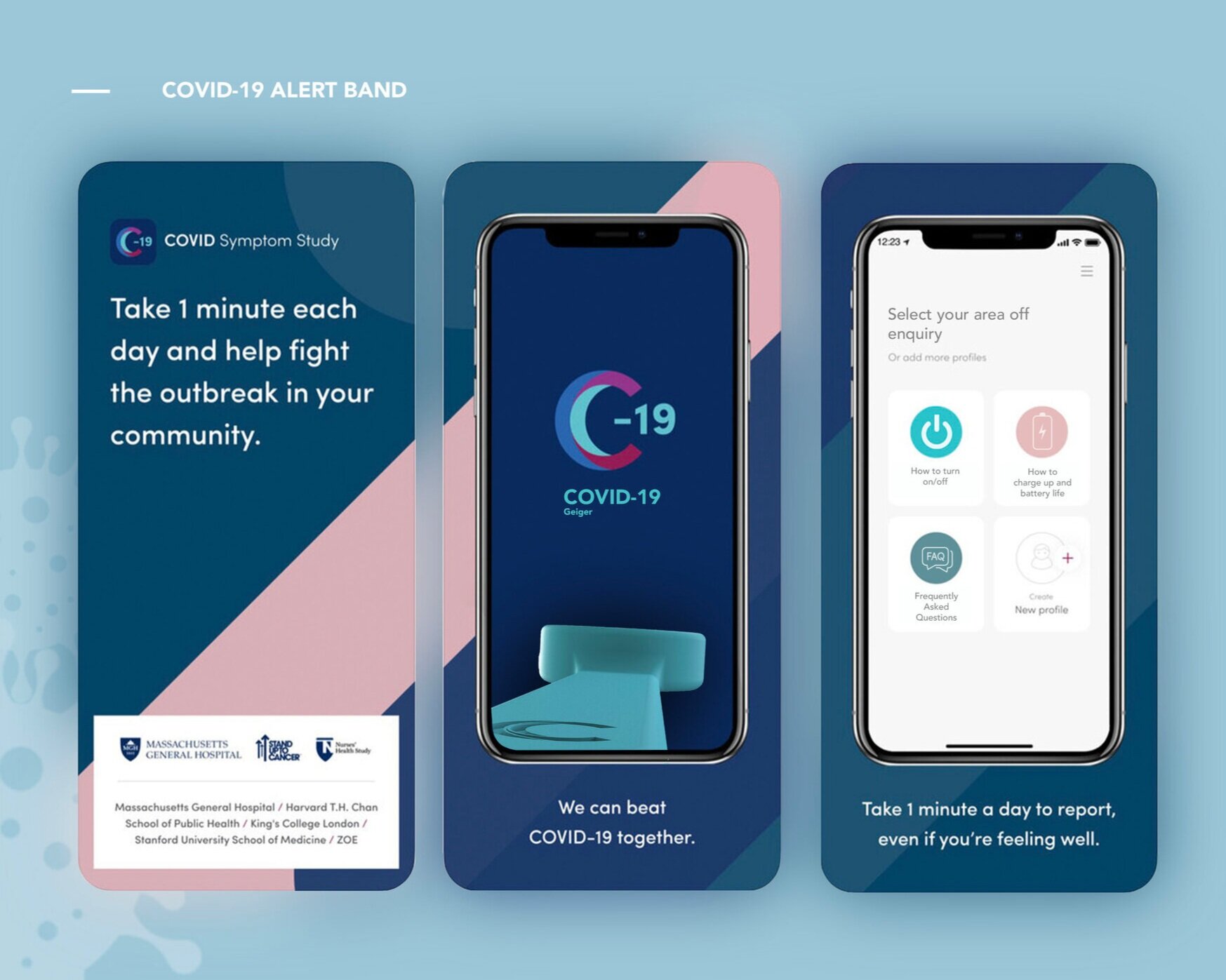
App Mock-up
Above and below is the app mock up for how the user purchases their band, or if the user decides to customise and upload the image for their band or button.
Though this would be at an additional cost.
Using the COVID Symptoms Study App, the user can register for the app to then gain access to the free Covid-19 Geiger band and find any information needed to use the band.
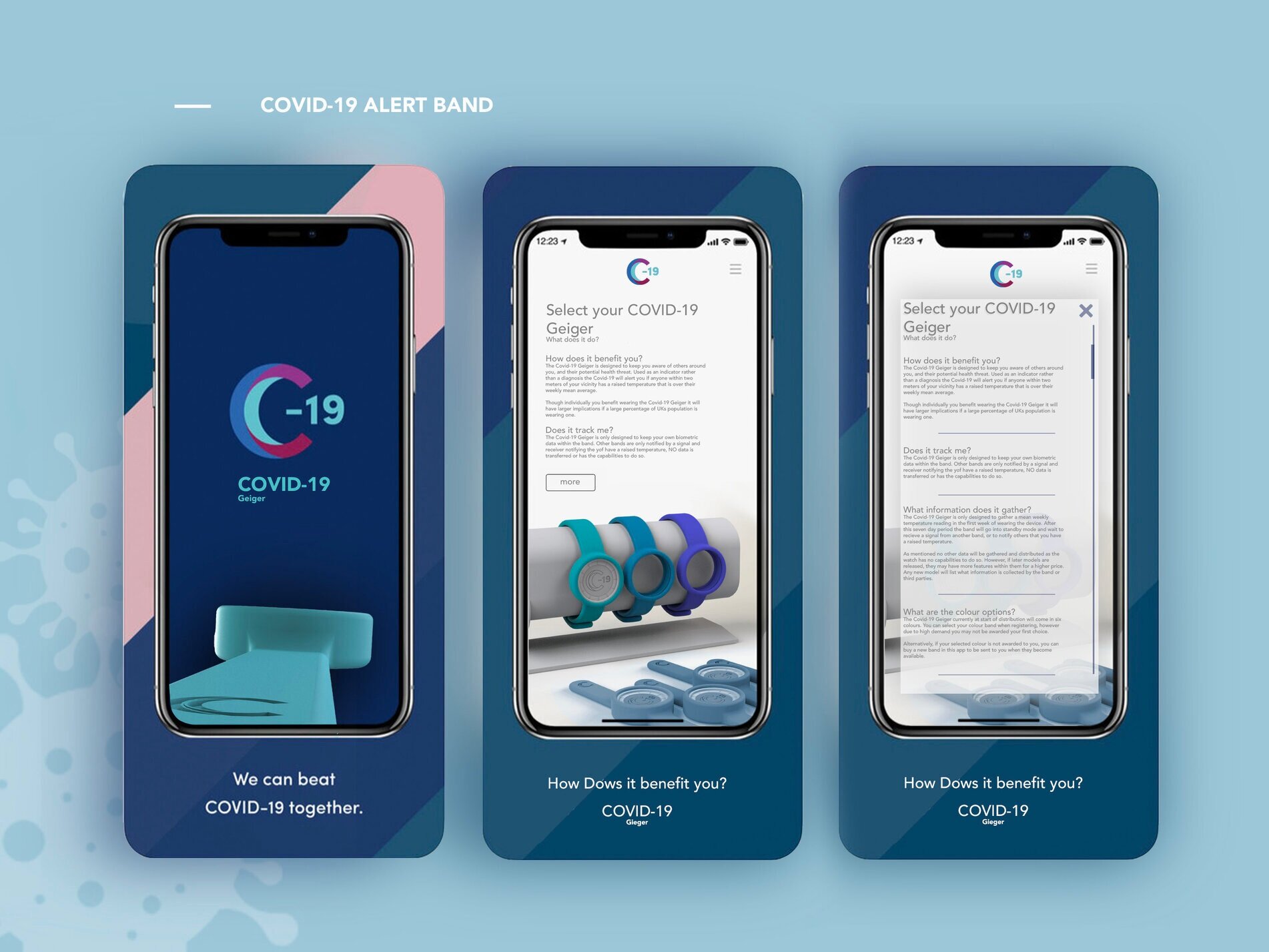
Including all the information necessary on the App eliminates the need for reprints for new news or updates on the state of the Covid-19 pandemic develops. Through the App, critical updates will be provided to the wearer.
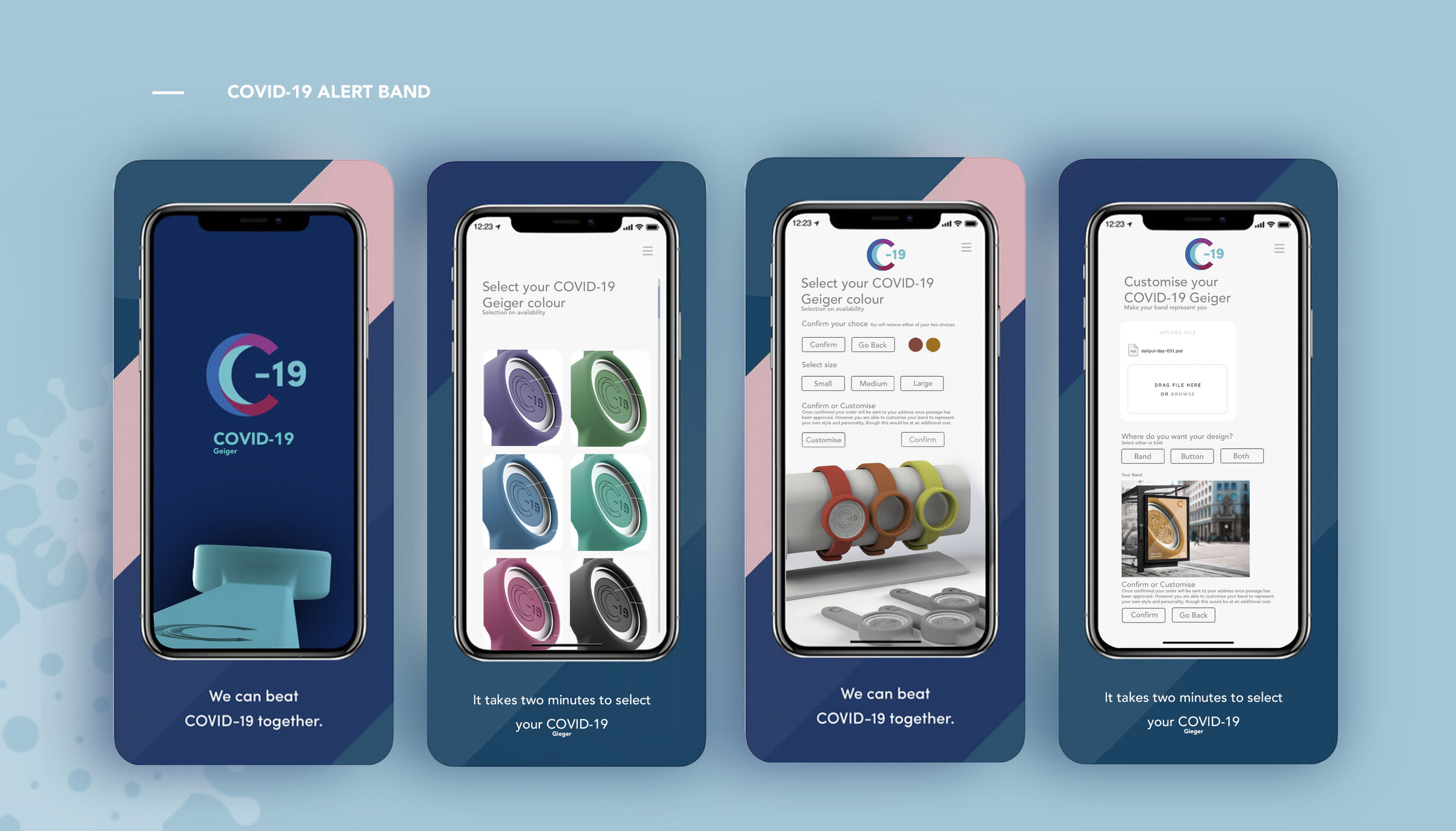
Packaging Design
As this product is a government initiative, though I would have like to create a sophisticated packaging design. It was essential to keep the packaging simple and easily handled even for people with low hand dexterity. The packaging is in two sections, the wrap-around cover and the main box which can be recycled once no longer needed. Below are a range of samples for more extravagant boxes for users who paid for extra detailing and customisation.

Strap Vector Application
Below are examples of band vector application
Band Variations
The band alterations can only be applied to a range of six colours. This is to reduce the cost in manufacturing; however, as the Covid-19 pandemic continues, more colour options will be available to buy, including more formal designs. Though with added materials will come with increased costs for the band, like most branded items, people will always want a higher quality product.



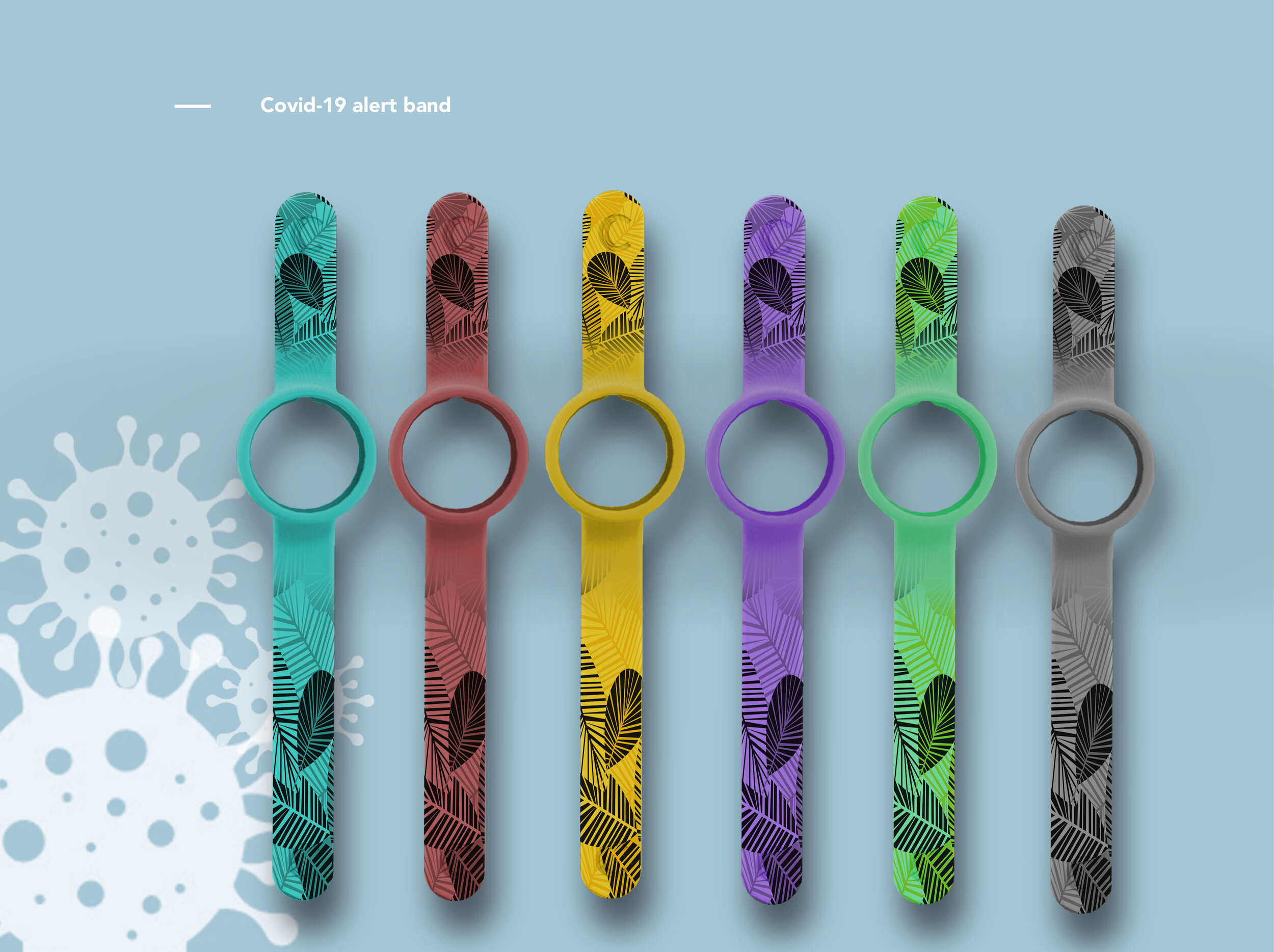

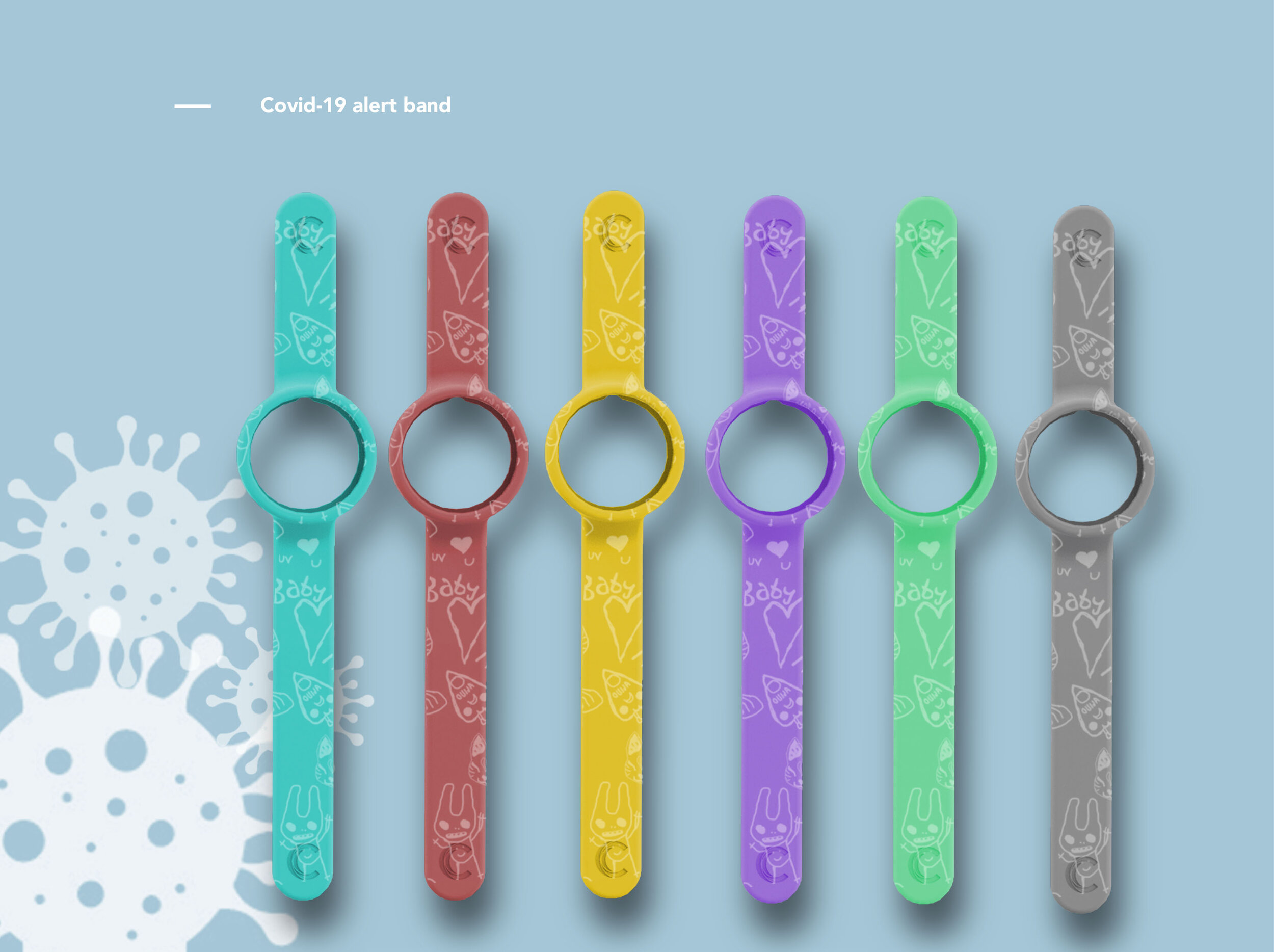

So What did I Learn?
So, what did I learn?
Overall, I enjoyed the project. Run over four days; the project taught me how to make quick snap decisions on a project and make adjustments through wearing the item and learning what a positive or negative of the design was. Wearing the watch for a day had a great befit in putting myself in the users' shoes, I was able to decide objectively if it was possible to wear watch for an extended amount of time, which was one of the main reasons I changed the strap from a buckle to a wrist wrap. As I soon realised that taking the watch on and off would require a decent level of hand dexterity ruling out some of the most vulnerable members of our society.
What would I improve?
Going forward, I would look at developing the UX functionality of the app. Creating user flows and mock-ups of the range of pages required for the app. Looking at the usability of the existing app and improving its functionality to work with the Covid-19 Geiger program, creating an area for constant updates and more ability to customise the bands to the users desire.
























